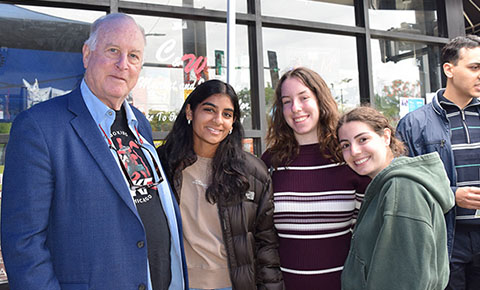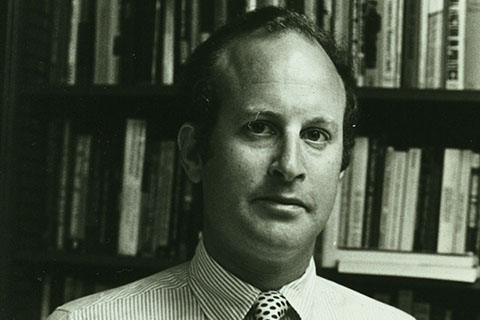Dan Lewis: “Where Do We Go From Here?”

Shadd Maruna’s introduction to graduate school was Dan A. Lewis’s “terrifying and electrifying” proseminar class, where students were expected to read a book a week. There was no lecture, no spoon feeding. Lewis demanded participation.
“You’d walk in, and it was ‘what did you think?’” said Maruna (PhD93), professor of criminal justice at Queen’s University Belfast. “We sat there, petrified over who would speak first. Three hours later, we’d had one of the best conversations in a long time.”
Maruna was one of more than 75 former students, friends, and colleagues who recently gathered in Annenberg Hall under the guise of a final class session with Lewis, who retired after 42 years at Northwestern’s School of Education and Social Policy. What most people really wanted to do, however–at least before the proseminar started–was tell Lewis how much he meant to them.
“I would not be here today (as an alumna) if not for Dan Lewis, who took me under his wing five years ago, and the guidance and mentorship that he showed me,” said Meghan Leggero (PhD22), echoing many others in the room. “I'll be forever grateful for the way that he changed my life.”
In addition to at least 15 alumni, the crowd included dozens of faculty members and special guests, including John McKnight, co-founder of the Asset-Based Community Development Institute at DePaul University. In 1969, McKnight helped build Northwestern’s Center for Urban Affairs. He was at the center of a group of interdisciplinary faculty who researched ways to support urban change agents and progressive urban policy, Lewis said.
"John’s work at the Center for Urban Affairs, building on a community’s assets rather than the deficits, had a great influence on me,” said Lewis, who joined the center in 1976. “That ragtag group of people became my peer group and friendship circle; they supported the type of work where ideas really matter. That work connected to the experience of people to innovative policies that rebuild a just city and society."
Lewis, professor emeritus of human development and social policy, spent his career challenging and mentoring students while encouraging them to get out of the classroom and into the community – now a staple of a SESP education.
A tireless advocate for the underdog, his research centered around criminal justice and mental health issues, as well as welfare reform and homelessness. His efforts led to crime prevention strategies, the deinstitutionalization of state mental-health patients, and school reforms that gave parents more power over their children’s education.
“Dan was good at getting students to think about the topics and points of view that would be unpopular at a liberal institution of education,” said Deborah Puntenney (PhD97), a retired SESP faculty member. “We read some of the most hideous, racist reasons to reform welfare. He asked to us to extract from these horrible things -- if there were reasonable ideas embedded in them, we should acknowledge and might contribute to making better policies. It was very valuable.”
 Lewis, originally from Chicago, came to Northwestern in 1980 after serving as director of Stanford Workshops on Political and Social Issues. Shortly thereafter, he helped psychologist Bernice Neugarten create SESP’s groundbreaking interdisciplinary Human Development and Social Policy program and revolutionized the practicum, making it more intellectually rigorous.
Lewis, originally from Chicago, came to Northwestern in 1980 after serving as director of Stanford Workshops on Political and Social Issues. Shortly thereafter, he helped psychologist Bernice Neugarten create SESP’s groundbreaking interdisciplinary Human Development and Social Policy program and revolutionized the practicum, making it more intellectually rigorous.
Over several decades, Lewis held nearly every SESP leadership position, including director of undergraduate education and chair of the graduate program on human development and social policy. He and Rob Donahue, director of the Center for Civic Engagement, designed the SESP Certificate in Civic Engagement in 2000. This laid the groundwork for the Center for Civic Engagement, where Lewis served as director for more than a decade.
As an instructor, Lewis was not one for faint praise. “I recall him commenting on a student’s paper that he “wouldn’t wrap his fish in this,” said Cheryl Milloy (PhD95), one of the first doctoral students in the HDSP program. “So when you received an A with the comment ‘to the top of the class—a beautiful paper’–yes, I still have that paper–you knew it meant something.”
“He prodded people, gently in some cases, harder in others,” Puntenney added. “He was sometimes explicitly critical but always encouraging throughout and very kind.”
Maruna, who cohosted the event with April Bernard (PhD99), associate professor of criminal justice at Chicago State University, recalled the staggering number of hours he and Lewis would spend talking ideas and diving deep into readings Lewis would send him.
“He taught me how to think in those sessions – certainly how to think like a social scientist,” said Maruna, who traveled from Ireland for the occasion. “He saw that sort of mentoring as the central aspect of his job in ways that I try–but fail–to recreate with my own students. He is the last of a dying breed in that sense, and I got extremely lucky to have him as a supervisor and a friend.”
Always the professor, Lewis closed out his final proseminar with a million-dollar question – where do we go from here? He then challenged scholars to return to the study of the city by really learning what’s going on in communities and delving into how poor and abandoned neighborhoods have been influenced by technology.
“Chicago has been the home of urban studies for more than 100 years,” Lewis said. “The current generation has an opportunity to revitalize the study of lives in our cities. That means weaving the psychology of the person together with the urban experiences that shape how we think and feel. And even more important these days is to understand how those persons can reshape the cities they live in.”